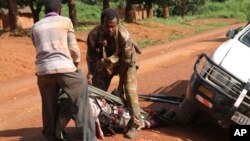NAIROBI —
Tens of thousands of people have fled their homes because of violence in the Central African Republic, according to the medical aid organization Doctors Without Borders. Aid workers have also witnessed an execution and other atrocities as security deteriorates.
Doctors Without Borders, known by its French initials MSF, reports violence has flared this month in the northwestern CAR, where government forces are battling local armed groups.
Many civilians have fled towns and villages for the forest, where they live without adequate shelter and with little access to food and water.
Head of Mission for MSF in the country, Ellen Van Der Velden, says civilians displaced around the town of Bossangoa, north of the capital, also are facing harsh conditions.
“In Bossangoa there’s a big Catholic mission, the size of say nine football fields, but it houses about 28,000 people -- this is a guestimate," said Velden. "It's difficult to calculate exactly or to count exactly but we believe it’s a number like that -- and you can just imagine how incredibly difficult are the circumstances when you have that many people on a small surface packed together.”
The fighting has been taking place in areas under the control of government forces, comprised of soldiers who seized power in a March coup as part of the now-disbanded Seleka rebel movement.
Seleka has been unable to assert control over the country, or even its own fighters, who are blamed for a wave of looting, killing and violent attacks in the country's interior.
MSF says its workers have witnessed the execution of a health worker and violent attacks on humanitarian staff, though it did not specify where the attacks happened or which groups were responsible.
Van der Velden says MSF has “good and clear” relations with CAR authorities, but that a lack of control over soldiers remains a concern.
“In their army or around the army [are] a number of elements that are less easily controlled and that of course is a constant worry, how much control they exert over all the elements that are in their midst," said Velden.
In a statement Wednesday, MSF said it has heard accounts that recent attacks are “characterized by religious divisions.”
In September, militia loyal to former president Francois Bozize attacked positions held by the predominantly Muslim Seleka forces in the northwest, and torched homes in Muslim neighborhoods, prompting retaliatory attacks.
Doctors Without Borders, known by its French initials MSF, reports violence has flared this month in the northwestern CAR, where government forces are battling local armed groups.
Many civilians have fled towns and villages for the forest, where they live without adequate shelter and with little access to food and water.
Head of Mission for MSF in the country, Ellen Van Der Velden, says civilians displaced around the town of Bossangoa, north of the capital, also are facing harsh conditions.
“In Bossangoa there’s a big Catholic mission, the size of say nine football fields, but it houses about 28,000 people -- this is a guestimate," said Velden. "It's difficult to calculate exactly or to count exactly but we believe it’s a number like that -- and you can just imagine how incredibly difficult are the circumstances when you have that many people on a small surface packed together.”
The fighting has been taking place in areas under the control of government forces, comprised of soldiers who seized power in a March coup as part of the now-disbanded Seleka rebel movement.
Seleka has been unable to assert control over the country, or even its own fighters, who are blamed for a wave of looting, killing and violent attacks in the country's interior.
MSF says its workers have witnessed the execution of a health worker and violent attacks on humanitarian staff, though it did not specify where the attacks happened or which groups were responsible.
Van der Velden says MSF has “good and clear” relations with CAR authorities, but that a lack of control over soldiers remains a concern.
“In their army or around the army [are] a number of elements that are less easily controlled and that of course is a constant worry, how much control they exert over all the elements that are in their midst," said Velden.
In a statement Wednesday, MSF said it has heard accounts that recent attacks are “characterized by religious divisions.”
In September, militia loyal to former president Francois Bozize attacked positions held by the predominantly Muslim Seleka forces in the northwest, and torched homes in Muslim neighborhoods, prompting retaliatory attacks.




